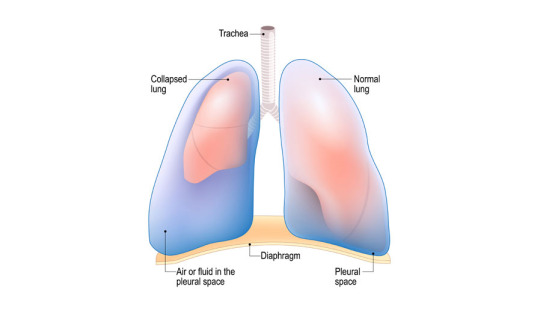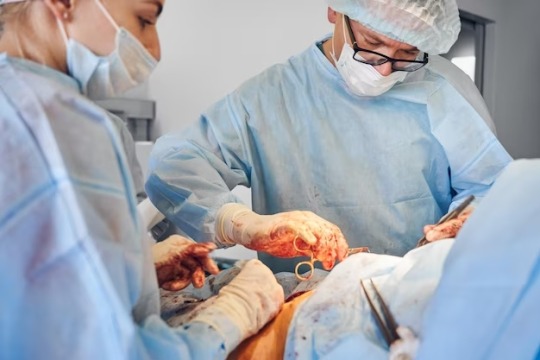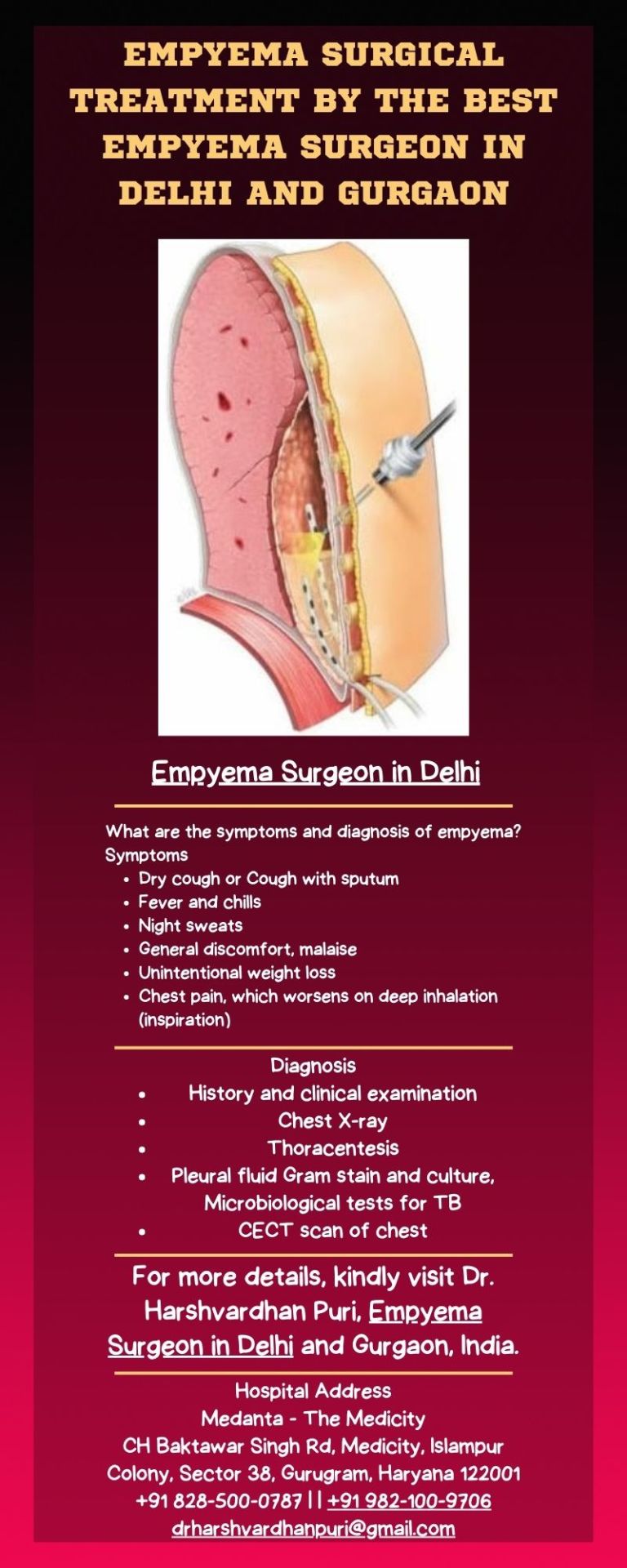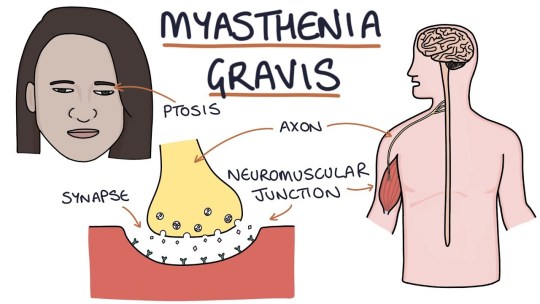#Pleural Effusion treatment in Delhi
Explore tagged Tumblr posts
Text
Understanding Pleural Effusion and Its Treatment in Delhi
Pleural Effusion, commonly referred to as "water on the lungs," is a condition where excess fluid accumulates between the layers of the pleura outside the lungs. This condition can result from various underlying causes, including infections, heart failure, liver cirrhosis, kidney disease, or malignancies. In Delhi, where access to advanced healthcare facilities is readily available, effective treatment options for pleural effusion are accessible to patients.
Symptoms and Diagnosis
Patients with pleural effusion may experience symptoms such as shortness of breath, chest pain, dry cough, and a feeling of heaviness in the chest. In some cases, Pleural Effusion treatment in Delhi might be asymptomatic and detected incidentally during a routine chest X-ray. Diagnosis typically involves a combination of imaging studies such as chest X-rays, ultrasound, or CT scans, and a procedure called thoracentesis. Thoracentesis involves the removal of a small amount of fluid from the pleural space, which is then analyzed to determine the underlying cause.

Treatment Approaches
The treatment of Pleural Effusion treatment in Delhi is tailored according to the cause, severity of symptoms, and the patient's overall health. Here are some common treatment approaches:
Thoracentesis: This procedure is both diagnostic and therapeutic. It involves the insertion of a needle into the pleural space to remove fluid. In cases where a large amount of fluid is causing significant symptoms, thoracentesis can provide immediate relief by reducing the pressure on the lungs.
Pleurodesis: For patients with recurrent pleural effusions, pleurodesis may be recommended. This procedure involves the introduction of a chemical or drug into the pleural space to create inflammation and cause the pleura to stick together, preventing further fluid accumulation.
Chest Tube Insertion: In cases of large effusions, especially if the fluid is infected (empyema) or associated with malignancy, a chest tube may be inserted to continuously drain the fluid. This helps in preventing the reaccumulation of fluid and allows the underlying lung to expand.
Medication: Depending on the underlying cause, medications such as antibiotics for infections, diuretics for heart failure, or chemotherapy for malignancies may be prescribed to treat the pleural effusion.
Healthcare Facilities in Delhi
Delhi is home to numerous top-tier hospitals and clinics that offer specialized care for pleural effusion. Leading healthcare institutions such as AIIMS, Apollo Hospitals, Fortis Healthcare, and Max Super Specialty Hospitals provide comprehensive diagnostic and treatment services, including advanced imaging, thoracentesis, and surgical interventions.
Conclusion
Prompt diagnosis and treatment of Pleural Effusion treatment in Delhi are crucial to prevent complications and ensure the best possible outcomes. With access to world-class healthcare facilities and experienced specialists, patients in Delhi can expect high-quality care tailored to their specific needs. If you or a loved one is experiencing symptoms of pleural effusion, it is essential to seek medical attention promptly to receive appropriate treatment and avoid potential complications.
#Pleural Effusion treatment in Delhi#lung transplant in Delhi#lung transplant in Gurugram#Pleural Effusion treatment#Pleural Effusion treatment in Gurugram
0 notes
Text
#best lung surgeons in Delhi#Empyema Treatment in Delhi#Pleural effusion#Pleural effusion in Delhi#Pleural effusion treatment in Delhi#thoracic surgeon in Delhi#Treatment Options for Empyema
0 notes
Text
0 notes
Text
Pleural Effusion surgeon in Delhi
Dr. Neetu Jain stands as a distinguished Pleural Effusion surgeon in Delhi, renowned for her expertise and compassionate patient care. With a profound understanding of thoracic medicine and advanced surgical techniques, Dr. Jain is dedicated to providing optimal treatment outcomes for her patients. Her commitment to excellence is evident through her comprehensive approach to diagnosing and treating pleural effusion, ensuring personalized care tailored to each individual's needs.
As a leading figure in the medical community, Dr. Jain has garnered acclaim for her surgical skill, employing minimally invasive procedures whenever possible to minimize patient discomfort and hasten recovery. Beyond her clinical practice, Dr. Jain is actively involved in research and education, contributing to the advancement of thoracic surgery and training the next generation of healthcare professionals.
Patients seeking expert care for pleural effusion can trust in Dr. Neetu Jain's expertise, knowing they are in capable hands dedicated to their well-being and recovery.

0 notes
Text
VATS Surgeon specialist in Delhi
A VATS surgeon specialist is a medical professional who specializes in performing surgical procedures using a minimally invasive technique known as Video-Assisted Thoracoscopic Surgery (VATS). VATS is a type of surgery used to diagnose and treat conditions within the chest (thoracic) cavity, such as lung diseases, pleural effusions (fluid accumulation around the lungs), and certain types of tumors.

VATS Surgeon specialist in Delhi
Key features of VATS include:
Minimally Invasive Approach: VATS involves making small incisions in the chest wall, through which a tiny camera (thoracoscope) and surgical instruments are inserted. This allows the surgeon to visualize the internal structures on a monitor and perform the surgery without the need for large incisions that are typically required in traditional open surgery.
Reduced Trauma: Since VATS involves smaller incisions, it often results in less postoperative pain, reduced scarring, and a quicker recovery compared to open surgery.
Faster Recovery: Patients who undergo VATS procedures generally experience shorter hospital stays and faster return to normal activities compared to those who undergo open surgery.
Precision: The high-definition camera used in VATS provides the surgeon with a clear view of the surgical site, enabling precise maneuvers and tissue manipulation.
Variety of Procedures: VATS can be used for various procedures within the chest, including lung biopsies, lobectomies (removal of a portion of the lung), lung volume reduction surgery, treatment of pneumothorax (collapsed lung), and more.
A VATS surgeon specialist undergoes extensive training to become proficient in performing VATS procedures. This training includes learning how to manipulate instruments and perform complex maneuvers through small incisions, as well as mastering the use of the thoracoscope to visualize the surgical field.
Patients who require thoracic surgery should consult with a VATS surgeon specialist to determine if this minimally invasive approach is suitable for their condition. It's important to note that not all cases are appropriate for VATS, and the decision will depend on factors such as the specific condition, the patient's overall health, and the surgeon's expertise.
0 notes
Text
Chest Surgeon in Delhi
As an AI language model, I can provide general information about the role of a chest surgeon and some common treatments they might perform. However, it's important to note that I am not a medical professional, and for personalized advice and treatment, you should always consult a qualified healthcare provider.

Chest Surgeon in Delhi
A chest surgeon, also known as a thoracic surgeon, is a medical specialist who deals with surgical treatments of organs within the chest cavity, such as the lungs, heart, esophagus, and other thoracic structures. Some of the conditions a chest surgeon may treat include:
Lung Cancer: Surgery may be performed to remove cancerous tumors from the lungs or other surrounding tissues.
Pneumothorax: A collapsed lung condition where surgery may be required to remove air or repair the lung.
Thoracic Trauma: In cases of severe chest injuries, surgery might be necessary to repair damaged organs or structures.
Esophageal Disorders: Surgical interventions to treat conditions like gastroesophageal reflux disease (GERD) or esophageal cancer.
Pleural Effusion: Excess fluid buildup around the lungs, which may require drainage or other surgical procedures.
Lung Transplantation: In cases of severe lung diseases, a lung transplant may be considered.
Thoracic Sympathectomy: A procedure to treat conditions like hyperhidrosis (excessive sweating) or certain vascular disorders.
Thymus Gland Disorders: Surgery to treat thymus-related conditions like thymoma or myasthenia gravis.
It's important to understand that each patient's case is unique, and the recommended treatment plan will depend on various factors, including the patient's overall health, the specific condition being treated, and the surgeon's evaluation.
If you or someone you know requires chest surgery or any medical treatment, it is crucial to seek the advice of a qualified medical professional who can provide a proper diagnosis and create an individualized treatment plan based on the patient's needs and circumstances.
0 notes
Text
Best cardiac and thoracic in Delhi

https://goo.gl/maps/C4B6ec3rV7pNCht57 Cardiac and thoracic refer to medical specialties related to the heart, chest, and associated organs. Here's some general information about cardiac and thoracic conditions, procedures, and treatments:
Cardiac Conditions:https://goo.gl/maps/C4B6ec3rV7pNCht57
Coronary Artery Disease (CAD): A condition where the blood vessels supplying the heart become narrowed or blocked.
Heart Failure: A condition in which the heart cannot pump enough blood to meet the body's needs.https://goo.gl/maps/C4B6ec3rV7pNCht57
Arrhythmias: Abnormal heart rhythms that can cause the heart to beat too fast, too slow, or irregularly. https://goo.gl/maps/C4B6ec3rV7pNCht57
Valvular Heart Disease: Damage or dysfunction of the heart valves that regulate blood flow.
Congenital Heart Defects: Structural abnormalities of the heart present at birth. https://goo.gl/maps/C4B6ec3rV7pNCht57
Cardiac Procedures and Treatments:
Coronary Angioplasty and Stenting: A minimally invasive procedure to open blocked or narrowed coronary arteries and restore blood flow to the heart. https://goo.gl/maps/C4B6ec3rV7pNCht57
Coronary Artery Bypass Grafting (CABG): Surgery to bypass blocked or narrowed coronary arteries using grafts from other blood vessels. https://goo.gl/maps/C4B6ec3rV7pNCht57
Heart Valve Repair or Replacement: Surgical procedures to repair damaged heart valves or replace them with artificial valves.
Cardiac Electrophysiology Studies (EPS): Diagnostic tests to evaluate abnormal heart rhythms and guide treatment decisions. https://goo.gl/maps/C4B6ec3rV7pNCht57
Pacemaker and Defibrillator Implantation: Devices implanted to regulate the heart's electrical activity and treat abnormal rhythms. https://goo.gl/maps/C4B6ec3rV7pNCht57
Heart Transplantation: Surgical replacement of a diseased heart with a healthy donor heart. https://goo.gl/maps/C4B6ec3rV7pNCht57
Thoracic Conditions:
Lung Cancer: Malignant tumors that develop in the lungs.https://goo.gl/maps/C4B6ec3rV7pNCht57
Pneumonia: Inflammation of the lungs usually caused by infection. https://goo.gl/maps/C4B6ec3rV7pNCht57
Pleural Effusion: Accumulation of fluid in the pleural space around the lungs.
Chronic Obstructive Pulmonary Disease (COPD): A progressive lung disease that causes breathing difficulties. https://goo.gl/maps/C4B6ec3rV7pNCht57
Thoracic Aortic Aneurysm: Abnormal bulging or dilation of the aorta in the chest.
Thoracic Procedures and Treatments: https://goo.gl/maps/C4B6ec3rV7pNCht57
Lobectomy or Pneumonectomy: Surgical removal of a portion (lobectomy) or entire lung (pneumonectomy) to treat lung cancer or other conditions.
Thoracic Endoscopy: Minimally invasive procedures to diagnose and treat conditions in the chest, such as biopsy or removal of fluid.https://goo.gl/maps/C4B6ec3rV7pNCht57
Video-Assisted Thoracic Surgery (VATS): Minimally invasive surgery using small incisions and a camera to treat various thoracic conditions. https://goo.gl/maps/C4B6ec3rV7pNCht57
Thoracic Aortic Aneurysm Repair: Surgical repair of a thoracic aortic aneurysm to prevent rupture. https://goo.gl/maps/C4B6ec3rV7pNCht57
Lung Transplantation: Surgical replacement of a diseased lung with a healthy donor lung. https://goo.gl/maps/C4B6ec3rV7pNCht57
Please keep in mind that this is a general overview, and specific diagnoses and treatments should be discussed with qualified medical professionals for accurate information and personalized care.
0 notes
Text
Best Pulmonologist in south Delhi
How Thoracoscopy procedure is performed and any risk involved?
According to Thoracoscopy Treatment Doctors in Delhi, a thoracoscopy is a minimally invasive surgical procedure that allows the doctor to access and visualize the inside of the chest cavity using a thoracoscope, a thin, lighted tube with a camera on the end. The procedure is performed through small incisions in the chest wall, rather than a large incision as in traditional open thoracic surgery. Thoracoscopy is used to diagnose and treat conditions such as lung tumors, pleural effusions, or empyema.
A thoracoscopy is a medical procedure that uses a thin, lighted tube called a thoracoscope to examine the inside of the chest. It is typically used to diagnose and treat lung diseases, such as pleural effusions, empyema, and lung cancer. Thoracoscopy can also be used to obtain a biopsy or remove fluid from the pleural cavity.
Thoracoscopy is performed by a thoracic surgeon, who is a specialist in surgical procedures related to the chest. They are trained to perform the procedure, which is usually done under general anesthesia.

In Delhi, there are several thoracoscopy doctors and treatment centers that provide specialized care to patients. Dr. Neetu is one of the thoracoscopy doctors in Delhi who specializes in thoracoscopy treatment. She is highly experienced in diagnosing and treating a range of lung diseases and conditions using thoracoscopy.
As per Best Pulmonologist in south Delhi, Thoracoscopy is a minimally invasive surgical procedure with relatively low risks compared to open thoracic surgery. However, as with any surgical procedure, there are some potential risks and complications, including:
1. Pain or discomfort in the chest area
2. Bleeding
3. Infection
4. Injury to the organs or blood vessels in the chest
5. Pneumothorax (collapsed lung)
6. Allergic reaction to anesthesia
It is important to discuss the specific risks and benefits of thoracoscopy with Thoracoscopy Treatment Doctors in Delhi and to follow their instructions for preparing for and recovering from the procedure to minimize the risk of complications.
A thoracoscopy is a minimally invasive surgical procedure that involves the insertion of a thin, lighted tube called a thoracoscope through a small incision in the chest to examine the inside of the chest cavity. During the procedure, the doctor will use the thoracoscope to view the lungs, pleura, diaphragm, and other structures in the chest cavity.
Here is what to expect during a thoracoscopy:
Preparation: Before the procedure, the doctor will explain the procedure, the potential risks and benefits, and what to expect after the procedure. You may be asked to stop eating or drinking for several hours before the procedure.
Anesthesia: A thoracoscopy is usually performed under general anesthesia, which means you will be asleep during the procedure.
Incision: The doctor will make a small incision in the chest through which the thoracoscope will be inserted.
Examining the chest cavity: The doctor will use the thoracoscope to view the inside of the chest cavity, take biopsies, and treat any conditions that are found.
Duration of the procedure: A thoracoscopy typically takes between 30 minutes to an hour.
Recovery: After the procedure, you will be taken to a recovery room to wake up from the anesthesia. You may experience some discomfort and chest pain, but these symptoms usually resolve within a few days.
Follow-up: Your doctor will schedule a follow-up appointment to discuss the results of the thoracoscopy and any additional treatment that may be necessary.
It is important to discuss the potential risks and benefits of the procedure with your doctor and ask any questions you may have before the procedure
So, if you are looking for the Thoracoscopy Treatment Doctors in Delhi, look no further than
Dr. Neetu . With her expertise and commitment to providing the best possible care, you can trust that your health is in good hands. Book an appointment with Dr. Neetu Thoracoscopy Doctors in Delhi today and take the first step towards a healthier future. Your health matters, and with Dr. Neetu on your side, you can be sure that you are in the best of hands.
0 notes
Link

People who are in a hunt for the best Empyema treatment in Delhi can get in touch with one of the best and most renowned surgeons, Dr. Belal Bin Asaf. Consult soon! Empyema Treatment in Delhi | Pleural Effusion Treatment in India | Dr. Belal Bin Asaf
#Empyema Treatment in Delhi#Pleural Effusion Treatment in India#Lung Cancer Treatment in Delhi#Best Chest Surgeon in Delhi#Thoracic Surgeon in Delhi#Dr. Belal Bin Asaf
0 notes
Link
Empyema is a collection of pus in the cavity between the lung and the membrane that surrounds it (pleural space). It is caused by an infection that spreads from the lung and leads to an accumulation of pus in the pleural space. This infected fluid can build up which puts pressure on the lungs causing them to collapse leading to symptoms of shortness of breath and pain. The commonest cause of empyema in our country is Tuberculosis. Empyema Treatment in Delhi | Pleural Effusion Treatment in India | Dr. Belal Bin Asaf

0 notes
Text
Exploring Lung Transplant Options in Delhi: A Comprehensive Guide
In the bustling heart of India, Delhi stands out as a hub for advanced medical care, particularly in the realm of lung transplants. For patients grappling with severe pulmonary conditions, the city offers hope through state-of-the-art treatments and expert care.
Why Delhi?
Delhi's reputation for medical excellence is well-earned. The city boasts a number of leading hospitals with specialized lung transplant in Delhi programs, providing patients access to cutting-edge technology and world-class medical professionals. The expertise of doctors like Dr. Arvind Kumar, renowned for his exceptional skills in lung surgeries, makes Delhi a premier destination for those seeking life-changing treatments.

What to Expect
Undergoing a lung transplant is a significant decision involving a series of critical steps. In Delhi, the process is streamlined with a focus on patient-centric care. From initial consultations and diagnostic assessments to the actual transplant procedure and post-operative care, the journey is meticulously managed. Dr. Arvind Kumar and his team ensure that each patient receives personalized attention, comprehensive care, and ongoing support throughout their treatment journey.
Success Stories
Many patients have found renewed hope through lung transplants in Delhi. With advancements in medical technology and the dedicated efforts of skilled professionals, the success rates are impressive. Stories of patients regaining their health and returning to an active life are a testament to the city's commitment to excellence in healthcare.
In Conclusion
For those considering a lung transplant in Delhi presents a beacon of hope. With its advanced medical facilities, expert care providers like Dr. Arvind Kumar, and a track record of successful outcomes, the city offers a robust pathway to improved health and a better quality of life.
For more information and to explore your options, visit Dr. Arvind Kumar’s website, where you can find detailed insights and guidance tailored to your needs.
0 notes
Text

Empyema Surgeon in Delhi
Empyema is a collection of pus in between the lung and chest wall formed by two pleural layers, visceral and pariteal.
It is caused by some infective process of the lung which leads to an accumulation of pus in the pleural space. The commonest cause of empyema in our country is Tuberculosis. It however can also be a complication of pneumonias, trauma with collection of blood inside the chest that gets infected. Repeated aspiration without asepsis of pleural fluids in cases of recurrent pleural effusion can also lead to infection of the fluid leading to empyema. Also empyema can happen after lung or chest surgery also.
Empyema is a collection of pus in between the lung and chest wall formed by two pleural layers, visceral and pariteal. Consult Dr. Harsh Vardhan Puri, the best empyema surgeon in Delhi and Gurgaon, for empyema surgical treatment.
#Empyema#Empyema Surgical Treatment#Empyema Surgeon in Delhi#Empyema Surgeon in Gurgaon#Empyema Surgical Treatment in Delhi
0 notes
Link
Empyema is a collection of pus in the cavity between the lung and the membrane that surrounds it (pleural space). It is caused by an infection that spreads from the lung and leads to an accumulation of pus in the pleural space. This infected fluid can build up which puts pressure on the lungs causing it to collapse leading to symptoms of shortness of breath and pain. The commonest cause of empyema in our country is Tuberculosis. Empyema Treatment in Delhi | Pleural Effusion Treatment in India | Dr. Belal Bin Asaf

0 notes
Link

History and Clinical Examination – The doctors review the patient symptoms by the way of a detailed medical history and conduct a physical examination. One the diagnosis is suspected, it can be confirmed by various tests. Myasthenia Gravis Treatment in Delhi | Myasthenia Gravis Doctor in Delhi | Dr. Belal Bin Asaf
#Myasthenia Gravis Treatment in Delhi#Myasthenia Gravis Doctor in Delhi#Empyema Treatment in Delhi#Pleural Effusion Treatment in India#Dr. Belal Bin Asaf
0 notes
Text
Pleural Effusion Doctors in Delhi NCR
Dr. Neetu Jain is a renowned name among Pleural Effusion doctors in Delhi NCR. With years of experience and expertise in pulmonary medicine, Dr. Jain has garnered immense respect for her dedication to patient care and commitment to excellence. She specializes in diagnosing and treating pleural effusion, a condition characterized by the accumulation of fluid in the pleural cavity surrounding the lungs.
Dr. Jain employs advanced diagnostic techniques and personalized treatment plans to address the unique needs of each patient. Her compassionate approach and comprehensive care ensure that patients receive the highest quality treatment and support throughout their journey to recovery.
As a leading expert in her field, Dr. Neetu Jain is trusted by patients and colleagues alike for her clinical acumen and compassionate care. Whether it's through innovative treatment modalities or patient education, Dr. Jain strives to make a meaningful difference in the lives of individuals battling pleural effusion in the Delhi NCR region.

0 notes
Link

Empyema is a collection of pus in the cavity between the lung and the membrane that surrounds it (pleural space). It is caused by an infection that spreads from the lung and leads to an accumulation of pus in the pleural space. This infected fluid can build up which puts pressure on the lungs causing it to collapse leading to symptoms of shortness of breath and pain. The commonest cause of empyema in our country is Tuberculosis. Empyema Treatment in Delhi
0 notes